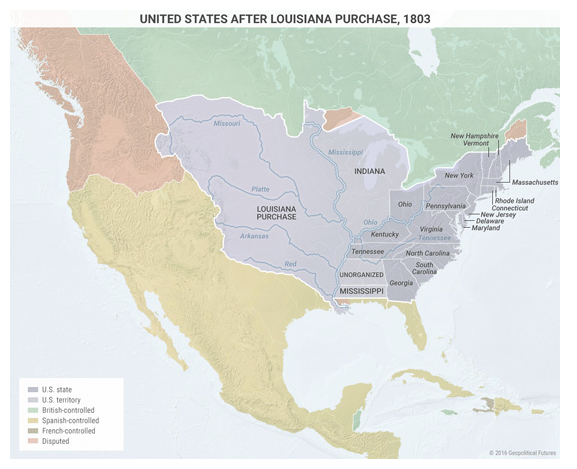What is striking about American strategy is its paradoxical nature: The fact that each solution to a threat poses a new threat. Since its birth, the United States has sought to defend itself. The US approaches each threat with a constant outward movement of attention and resources … and now, it straddles the world. This means that the political, economic, and military postures of the United States have tended to be offensive.
The Birth of a Nation: Destined for Manifest Destiny
Consider the US at the time of its founding. The colonial United States existed on a relatively thin strip between the Appalachian Mountains and the Atlantic Ocean. Its north-south communication was weak, as most rivers run from the mountains to the Atlantic. That meant not only that commerce was difficult, but also that the rapid movement of troops to repel an invasion was difficult.
Therefore, even after it declared independence, the United States was heavily dependent on maritime trade with Europe, and particularly England. England dominated the Atlantic Ocean, especially after the defeat of Napoleon and the destruction of the French navy.
The United States had lands west of the Appalachians, but they were minimally settled. Its heartland was a narrow eastern strip close to the Atlantic Ocean, and it was vulnerable to the British navy, which could carry out amphibious operations at any point along the coast.
Navies are expensive, and the United States couldn’t guarantee its national security until its economy had developed dramatically. That was difficult as long as the US was confined to the eastern seaboard. If it could not block British naval power, then it had to have strategic depth: The West.
Westward Ho!
The land west of the Appalachians was extraordinary—not just because of its rich soil, but because of the Mississippi River system. Two great rivers, the Missouri and the Ohio, flow into the Mississippi. They are joined by other smaller but very significant rivers like the Arkansas and Tennessee that flow into the Mississippi, which then flows into the Gulf of Mexico.
The most extraordinary thing about this river complex is that it is navigable. That means that virtually any part of the land between the Rockies and Appalachians could not only produce agricultural products—and later minerals—but could also ship them inexpensively through this river system and eventually to Europe.









